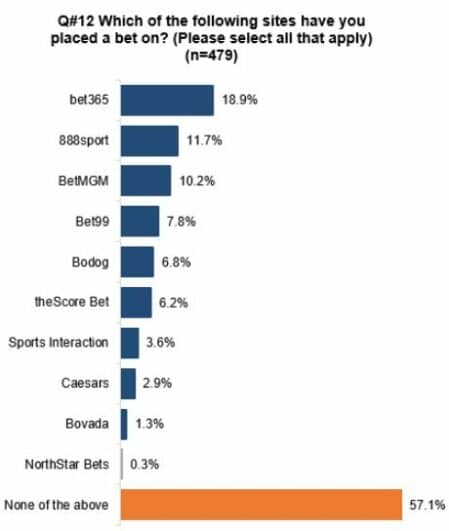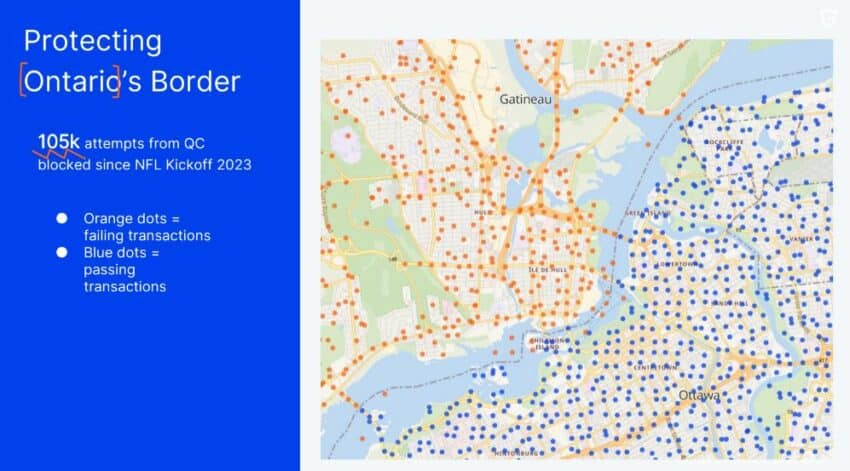
Each week, Canada Sports Betting recaps all the top sports betting and iGaming news in Canada and highlights upcoming events.
Our top stories this week
- New Survey Finds Two-Thirds Of Quebeckers In Favour Of Regulated Igaming Model
- Three Great Value Bets To Make The 2023 NFL Playoffs
- Blue Jays’ Odds To Sign Shohei Ohtani Shorten As MLB Winter Meetings Get Underway
- NorthStar Bets NHL Schedule Preview: Week Of December 4-10
- NorthStar Bets Weekly NHL Betting Insights (Dec. 5)
- Bet365 Thursday Night Football Preview: Patriots Vs. Steelers (Dec. 7)
- The Puck Portfolio Podcast With Andy MacNeil
- Bet365 NHL Odds, Preview: Maple Leafs Vs. Senators (Dec. 7)
- Jake’s Takes: Your Guide To NFL Week 14 Odds, Betting Mismatches, Props & Trends
Event of the week
NBA In-Season Tournament – Dec. 7, 9
The field has been narrowed to just four teams for the inaugural NBA Cup, as the In-Season Tournament progresses to the semifinal stage on Thursday.
The Milwaukee Bucks and Indiana Pacers will clash in the East semifinal, with the Bucks listed as 5.5-point favourites over the Pacers. In the West, the Los Angeles Lakers are being tabbed as two-point favourites over the New Orleans Pelicans.
Before the start of the season, the Pacers had long +3300 odds to win the tournament at bet365. New Orleans was also a longshot at +2800 to claim the inaugural NBA Cup.
The two victors on Thursday will clash in the championship game on Saturday night.
BetMGM thriving in Ontario
Since iGaming Ontario’s quarterly market reports don’t include any data on market share, the general public has no official idea which private operators are thriving in Ontario’s regulated igaming market.
However, earlier this week during a business update, BetMGM executives shed some light on how their igaming and sports betting products have been performing in the province.
“We continue to be a market leader with a combined market share in the third quarter of 17% in online sports betting and igaming across the U.S. and Ontario,” said BetMGM CEO Adam Greenblatt. “This puts us firmly in the top tier of the industry, with all smaller competitors garnering low-to-mid single-digit shares. Our U.S.-only share is more than double that of the fourth-ranked operator. This is likely to be even more pronounced if we take Ontario into account, where we command 22% share across OSB (online sports betting) and igaming. We are particularly pleased with proving we can win there, as Ontario is an extremely competitive market.”
BetMGM’s claim to have a 22% market share in the province is shocking considering there are now over 50 operators and 70 igaming sites live in Ontario, not including the Ontario Lottery and Gaming Corporation’s digital PROLINE + and iCasino products.
Industry analysts presumed grey market operators, who had been doing business in the province for decades before the launch of the regulated market, would continue to dominate market share due to their existing player databases and brand recognition with Ontarians.
BetMGM, a major U.S. operator, was one of the first operators to launch in the province on April 4, 2022. It didn’t have the luxury of an existing Ontario player database, like daily fantasy sports operators FanDuel or DraftKings, or grey market operators like bet365, Pinnacle, and Betway, among others.
BetMGM rolled out an aggressive marketing campaign across the province upon its launch, using Wayne Gretzky and Connor McDavid to appeal to hockey bettors. Ads featuring celebrities like Jamie Foxx and Vanessa Hudgens were also used to target Ontarians. However, BetMGM’s success in Ontario is likely due to the strength of its iCasino offerings.
According to iGaming Ontario’s Q2 market report (July 1-Sept. 30, 2023), casino games, including slots, live and computer-based table games and peer-to-peer bingo, accounted for nearly $11.9 billion (84%) of total wagers and $407 million (75%) of gaming revenue. Betting, including on sports, esports, proposition and novelty bets, as well as exchange betting, accounted for only $1.9 billion (13%) of total wagers and $118 million (22%) of gaming revenue. Online poker made up the other 3% of total wagers.
“The MGM brand counts for a lot,” Greenblatt said during the presentation. “There is a high degree of awareness in Ontario. We weren’t surprised by our performance in Ontario. We see Ontario as a multi-product jurisdiction really benefiting from the strength of our offering, of our go-to-market offering in iGaming as well as the ever-improving strength of our OSB product.
“Of course, in our multi-product states and Ontario, players often engage in both sports betting and casino gaming. Cross-sell is an important driver of revenue in those markets. And in Q3 this year, around 65% of our sports players in the multi-product states engaged with either casino or poker or both.”
In July 2022, Canada Sports Betting conducted a comprehensive survey asking Ontario sports bettors about their operator preferences, among other things. Grey market operators bet365 and 888sport were the most popular, with 10.2% of respondents saying they had placed a wager with BetMGM in the early days of Ontario’s regulated sports betting market. The sports betting landscape in Ontario has likely shifted since last July, as sports bettors have now had time to try out a plethora of new online sportsbooks and redefine their preferences.

Québec Online Gaming Coalition partners with GeoComply
Just days after releasing a new survey detailing the public outcry for a regulated online gambling market in Québec, the Québec Online Gaming Coalition announced it has partnered with GeoComply, which will support the Coalition’s work in Québec by providing up-to-date and accurate data on Quebecers players’ online gaming habits.
Recent data from GeoComply, a third-party location service provider that provides cybersecurity solutions to detect location fraud and verify a user’s true identity, also confirms that Quebecers are eager to wager with private operators. The Vancouver-based company has blocked a staggering 105,000 attempts from online gamblers in the province to access private operators in Ontario since the start of the 2023 NFL season.

“GeoComply proudly joins the efforts of the coalition to advocate for a modernized online gaming market that maximizes consumer protection, strengthens integrity and delivers meaningful revenues to Quebec,” said SVP Compliance with GeoComply, Lindsay Slader, in the press release. “Ontario’s success has proven that in an open yet regulated market, everyone wins.”
GeoComply, which just recently opened an office in Toronto, is the preferred provider of geolocation services for several private operators in Ontario’s regulated igaming market and all across the United States.
The coalition, which consists of Betway, Bet99, DraftKings, Flutter, Entain, RushStreet, and Apricot, launched in May 2023 with the aim of pushing the Québec government to modernize the current system by establishing a licensing and tax system and creating an independent regulatory body to oversee the gaming sector in Québec.
The coalition’s efforts are being heavily opposed by Loto-Québec, a crown corporation which has solely acted as the province’s regulator of gambling since 1969. All proceeds earned by Loto-Québec are reinvested back into provincial programs and services.
The coalition says a shift to a regulated market in Québec could produce roughly $230 million in royalties to the provincial government.
AGCO taking steps to clarify new ad standards
Canada Sports Betting has learned that the Alcohol and Gaming Commission of Ontario has sent operators and industry stakeholders an update on the roundtable meetings held in November regarding its revised advertising standards, which will take effect at the end of February.
On Nov. 28, the AGCO informed operators that their concerns and feedback were being taken into account and that the regulator is drafting guidance to “provide as much clarity as possible with the aim of reducing grey areas.”
The AGCO is also reiterating that its standards are intentionally broad to give operators the flexibility to make decisions. A final guidance document will be posted on the AGCO’s website later this month or early in the new year, well before the suggested deadline.
In August, the AGCO announced operators would no longer be able to use current or former athletes, celebrities, social media influencers, and/or entertainers “who would likely be expected to appeal to minors” in their advertising unless that advertising pertains to responsible gambling messaging.
Several medical and mental health organizations have condemned the advertising blitz associated with the launch of Ontario’s regulated iGaming market, citing increases in clients dealing with problem gambling issues.
UBC’s Centre for Gambling Research awarded renewed investment
On Tuesday, the University of British Columbia announced that the province and the BC Lottery Corporation (BCLC) have renewed a $1.4 million investment in the university’s Centre for Gambling Research.
“At BCLC, the well-being of our players is paramount and we’re always looking for opportunities to offer safer gambling experiences,” said Pat Davis, President and CEO of BCLC, in a press release. “Knowledge that we gain from the Centre for Gambling Research at UBC helps us consider enhancements to the programs and initiatives that promote player health at BCLC and beyond. We’re pleased to continue providing support to the centre so its work can continue to guide the industry.”
The Centre for Gambling Research at UBC was established in 2014 to advance the understanding of the psychology of gambling, to reduce the harms associated with problem gambling and to improve evidence-based gambling policy. The Centre studies psychological, clinical and neuroscience aspects of gambling, and provides teaching and research training.
The Director of the institution, Luke Clark, has been one of the leading voices on Canada’s West Coast regarding problem gambling studies and issues. He was recently interviewed by the Vancouver Sun for his professional opinion on the potential harms associated with sports betting ads.
British Columbia’s provincial government and BCLC have been funding the centre since its inception in 2014.